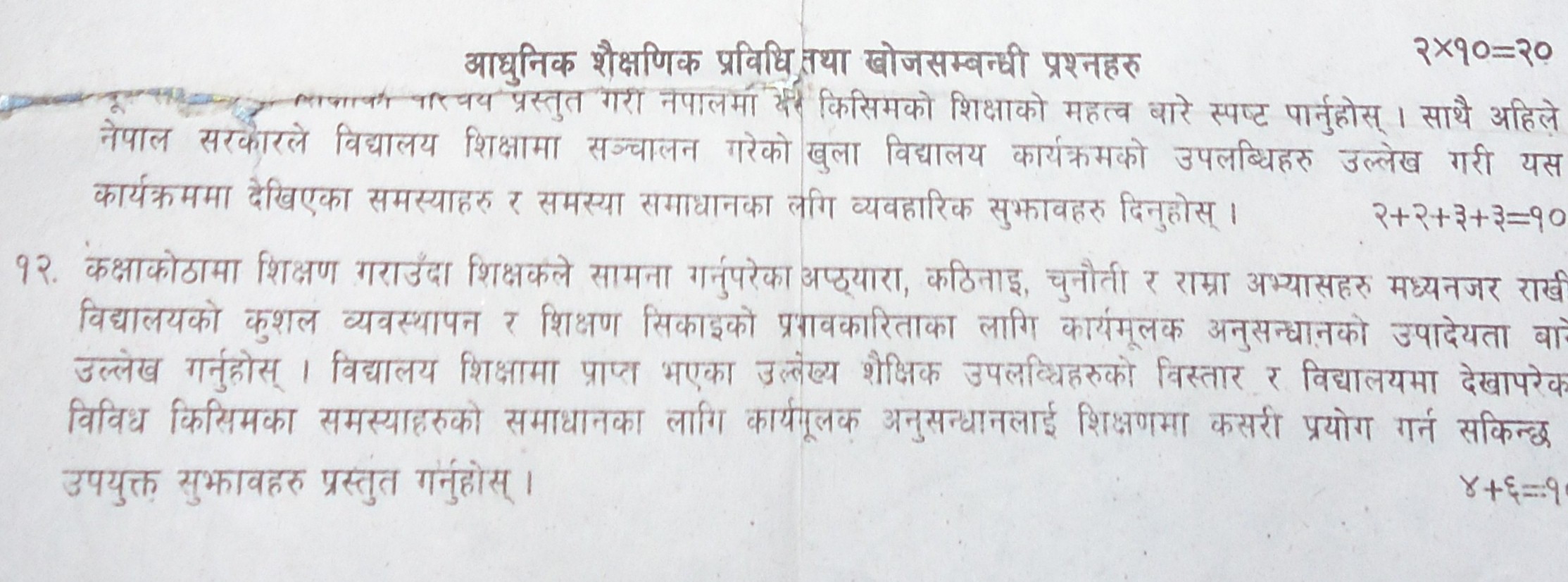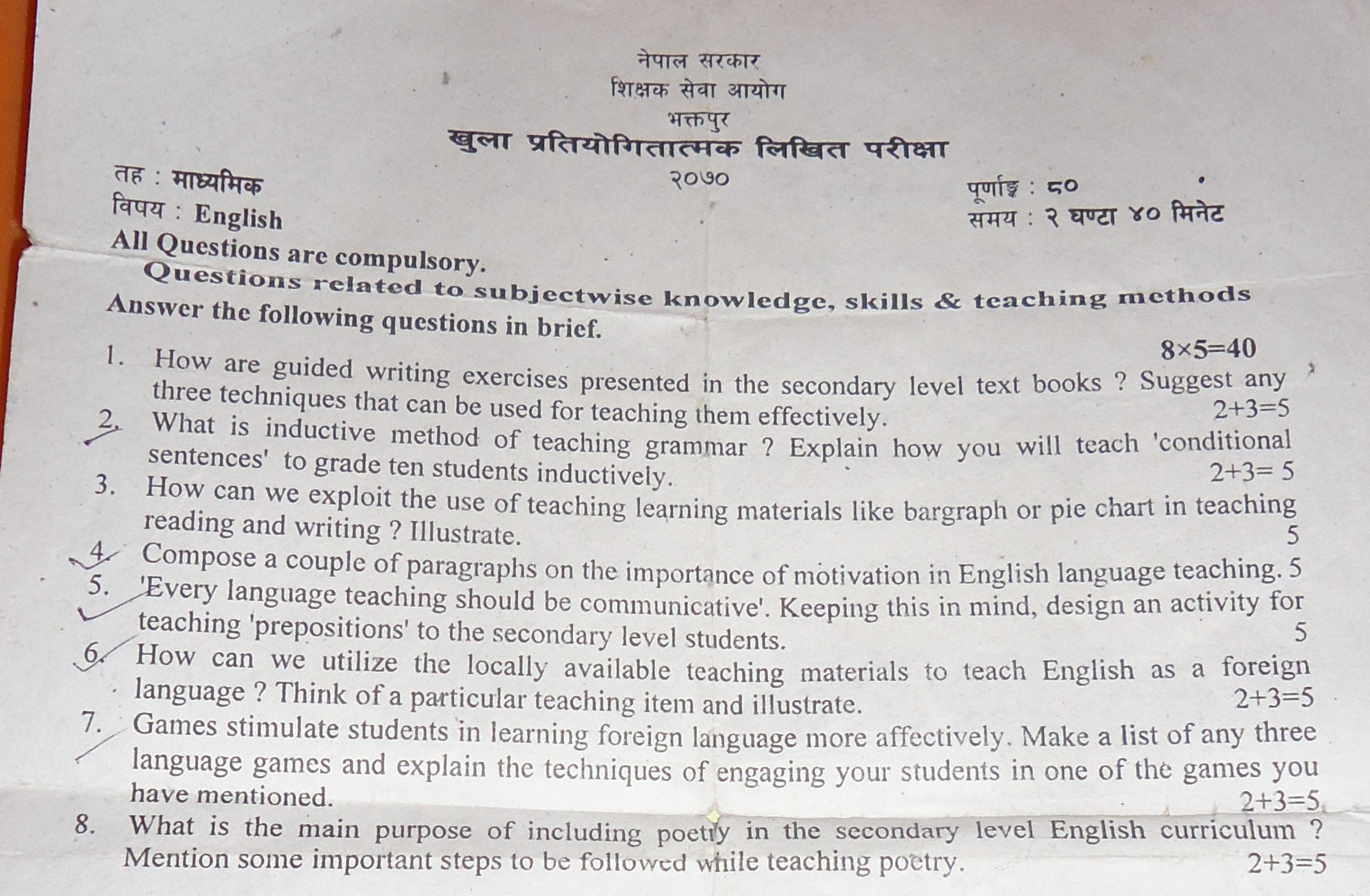Praveen Kumar Yadav
After a gap of nearly 17 years, recently Teacher Service Commission (TSC), the government body to appoint teachers for community schools, has recruited teachers for Secondary, Lower Secondary and Primary levels across the country. The process consisted of both written and oral examinations. For written examinations, a total of a total of 413,000 examinees across the country had appeared. Based on results of the written examinations, those successful candidates were called for the interview.
NeltaChoutari would like to congratulate all those who succeeded in TSC exams and have recently become teachers in government owned community schools.
Out of those successful teachers, the three have shared their experience and reflections through this blog entry. They have been appointed by the government to teach English in secondary levels. Specifically, they have presented their reflections under three different sections included in the written test.
Kishor Parajuli:
I have been teaching aspects of ELT theoretically to students pursuing higher studies on the one hand, and at the same time, I have been implementing those theories while teaching English at secondary level.
As you see all the questions included in this section are basically related to pedagogy. While answering them, I have integrated my experiences of teaching students English theoretically as well as practically.
Even facilitating and attending in different professional development activities, especially conducted by NELTA in Kathmandu, Makwanpur and other branches have provided me enough exposure to answer these questions comprehensively.
Upendra Kafle:
Te aching means creating environment where our students can learn many things. While creating such an environment, we apply many theories, methods and techniques. When applied, some of them become effective while others turn out to be ineffective. Hence, based on the best of classroom teaching practices, I have answered the questions from this section. Besides, my answers have reflected on my own experience of teaching different aspects, including teaching grammar, use of teaching materials, language games, teaching poetry and writing exercise.
aching means creating environment where our students can learn many things. While creating such an environment, we apply many theories, methods and techniques. When applied, some of them become effective while others turn out to be ineffective. Hence, based on the best of classroom teaching practices, I have answered the questions from this section. Besides, my answers have reflected on my own experience of teaching different aspects, including teaching grammar, use of teaching materials, language games, teaching poetry and writing exercise.
Abadhes Ray:
 Apart from my knowledge and experience with ELT, I, as a regular reader, must give credit to Choutari for enabling me to answer these questions. I recalled different blog entries that I have read here on the blog while answering those question. For instance, some of the articles I found useful for me to answer the questions of this section include the blog post.
Apart from my knowledge and experience with ELT, I, as a regular reader, must give credit to Choutari for enabling me to answer these questions. I recalled different blog entries that I have read here on the blog while answering those question. For instance, some of the articles I found useful for me to answer the questions of this section include the blog post.
Not only this, I did two online courses from Oregon University and Maryland University, which were very effective for learning. Training and access program have also enhanced me to effectively write answers.
Kishor Parajuli:
This section includes problem solving questions. While answering such questions, I reflected on my own experience of facing challenges and problems teaching English to secondary schools. Some of key pertinent problems I mentioned in the test include English teachers’ reluctance in adopting changes in teaching practice, methods and techniques, traditional translation method that still exists in schools, lack of reflection about their teaching and how the learners can learn better, lack of evaluation and follow up of trainings, and application of action research. For such problems, there’s the only solution, i.e. comprehensive engagement of English teachers in various modes of professional development. A teacher should not only teach, but they should also play a series of roles—of a facilitator, a problem solver, a trainer, an instructor, a guide, a leader and many more.
To cater the needs of individual learners from different cultural and linguistic backgrounds, the teacher should apply an appropriate method and practice based on action research. Besides, they can organize group discussions, focus group discussions, and role plays for their active and meaning participation in the classroom, by adopting learner centered teaching methods.
Upendra Kafle:
Over a decade of my involvement in English language teaching, I have come across several problems, and I have also solved them properly by adopting practical measures. Firstly, based on my own experience of problem solving, I attempted the question. Secondly, ELT researches and case analysis of different contexts that I have gone through during and after my academic career were equally helpful. Finally, I have used my observation and learning from various professional development trainings in order to answer the questions.
Abadhes Ray:
As a reader of Choutari and a teacher, I was familiar with the problems and their solution faced in ELT. Besides, I had taken two online courses from Oregon University and Maryland University respectively. I was also an access teacher and attended ELT trainings. All these professional engagements with ELT community have been quite supportive while answering the questions. 
Kishor Parajuli:
In my opinion, the concept of open school program introduced by the government is quite good with the view to providing education to all and especially targeting to those who cannot attend school regularly. However, problems I have seen are on the part of execution. The success of the program would reach a high only after all the stakeholders are sensitized on the significance of open school program, and they also play their respective roles.
I find teachers themselves responsible behind classroom problems. While teaching the students, they face challenges and also celebrate their achievements. It is the teachers who witness stories of success and failure of their efforts in the classroom. What they can do is they can carry out an action research in order to learn from failure and replicate and scale up best practices to improve teaching learning activities.
Upendra Kafle:
Awareness for the government’s open school program is yet to be raised as I do not find many target groups, viz. students and guardians familiar with the program. As a result, they have not been able to get benefitted substantially. Besides, local ownership for the program needs to be developed for effective implementation.
No doubt, action research is an appropriate and common tool to solve all the problems related to teaching. It includes problem investigation, taking action & fact-finding. Based on the findings, teachers can adopt most appropriate strategy within its own teaching environment.
Abadhes Ray:
Lack of massive orientation to the target groups and low participation are key problems I have identified so far in the government’s open school program. The participation needs to be encouraged through stakeholders’ engagement in execution.
In order to scale up effective classroom practices and solving pedagogical problems in ELT, action research can be applied for tangible improvement. It is useful for both classroom management and effective teaching practice. A small scale research can be carried out on a specific aspect of teaching. Its application can further improve the teaching and learning outcomes.


